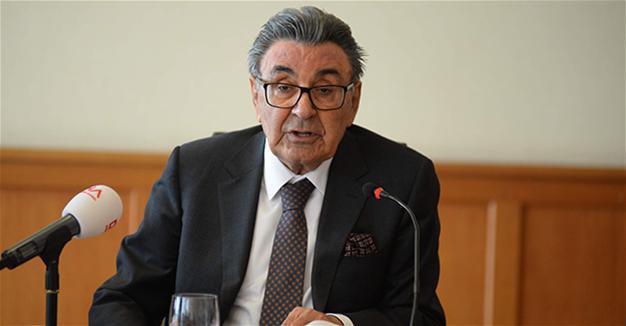Petrol Ofisi case devoid of legal, concrete base: Aydın Doğan
ISTANBUL
 Doğan Group Honorary Chairman Aydın Doğan has declared a case into one of the group's former companies, Petrol Ofisi, to be entirely devoid of any legal or concrete basis during the latest hearing into the case on May 8.
Doğan Group Honorary Chairman Aydın Doğan has declared a case into one of the group's former companies, Petrol Ofisi, to be entirely devoid of any legal or concrete basis during the latest hearing into the case on May 8.“The fact that the officials in the incorporated company are accused of ‘forming a group to commit crimes,’ ‘being close to the formed group,’ ‘forgery in official documents’ and ‘fuel smuggling’ is irrational and incomprehensible,” Doğan told the court, adding that he was not on the board of directors of Petrol Ofisi, an oil retailer formerly owned by the Doğan Group.
The accusations in the case date back to between 2001 and 2008 when Doğan Holding and İşbank, and later OMV, were stakeholders in fuel distributor Petrol Ofisi. Prosecutors accuse İşbank, Doğan Holding, OMV and then-Petrol Ofisi managers of undervaluing the value of 56 cargo transactions between 2001 and 2007.
Noting that the holding won the tender within the framework of the law, Doğan said he went to the company’s building less than 10 times in 10 years.
“There is no legal or logical basis to the allegations of the crimes committed. This is an unjust case. As I said before, I wasn’t on the board of directors of this company. Petrol Ofisi was in our holding’s body for 10 years. However, I never actually participated in any of the operations of the company. The total number of my visits to the company building doesn’t even amount to 10,” he said.
Four suspects attended the hearing held on May 8 at the Istanbul 1st Court of Serious Crimes.
In his defense, Doğan rejected all charges and said they were unfounded accusations directed by Hayyam Garipoğlu.
“One of the accusations directed against me during the investigation stage by the public prosecutor was an unfounded accusation by Hayyam Garipoğlu during the tender stage of Petrol Ofisi’s privatization. We won the tender within the framework of the laws which suit all procedures. Again, I don’t accept the accusations regarding tax losses from fuel smuggling. No tax is collected from imported fuel regardless of which country it was imported from. The KDV [value added tax] of imported fuel is reflected in the prices at the pump over the price that the state conveys and receives,” Doğan said.
Doğan said information regarding all the companies within the holding are sent by the holding’s accountants in periods of three months.
“I examine them. I look at the companies’ profit and loss situations and other issues,” he said.
A two-paged written defense submitted by Doğan to the court reads as follows:
“After the Turkish Privatization Board announced that Petrol Ofisi’s public stake of 51 percent was going to be sold with an open tender, İş-Doğan Petrol Yatırımları A.Ş. was established in July 2000 with a 50 percent share for both İşbank A.Ş. and Doğan Şirketler Grubu Holding A.Ş. I don’t have any personal stake in this company, and I’ve never been on the board of directors of this company and Petrol Ofisi A.Ş. The company was [equally] represented and managed by representatives of İşbank A.Ş. and Doğan Şirketler Grubu Holding A.Ş. in accordance with the stake ratio.
“On Sept. 2, 2005, İşbank A.Ş. transferred the stake within its possession to Doğan Holding and left the partnership. After that, Doğan Holding A.Ş. sold 34 percent of its stake in POAŞ [Petrol Ofisi A.Ş.] to Austrian-based OMV Aktiengesellchaft. According to the agreement conducted with OMV, Petrol Ofisi A.Ş. would again be represented and managed in a 50 percent partnership. Hence, POAŞ has always been a company that was managed in a joint administration with other partners. Doğan Şirketler Grubu Holding A.Ş. left the partnership by selling its entire 54.17 percent stake in POAŞ to OMV Aktiengesellchaft on Sept. 22, 2010.
“Within this extent, it is irrational and incomprehensible that the officials in the joint-stock company are accused of ‘forming an organization to commit crimes,’ ‘being members of the formed organization,’ ‘forgery in official documents,’ and ‘fuel smuggling’ based on a report dated Nov. 3, 2010, which was prepared as a result of an investigation that was launched on June 5, 2009, by the Turkish Prime Ministry Undersecretary’s Customs Inspection Board. It does not have any concrete or legal basis.
“I only received information from company officials regarding the profit and loss balance of Petrol Ofisi, just like other companies within the Doğan Şirketler Grubu Holding A.Ş. It is actually not possible for me to have information on the import operations and it’s not within the scope of my profession and information.
“According to the information given to me, in the customs report it is claimed that a declaration of 6 million dollars of reduced value was made, which corresponds to one in a thousand of Petrol Ofisi A.Ş.’s imports worth a total of 6 billion dollars that were made from the POINT company. However, such a declaration of reduced value is absolutely out of the question. There is no customs tax on fuel imports. Only VAT is paid. The VAT paid at customs is appropriated from the VAT that is obtained by the ultimate consumer and the remainder of the VAT is paid to the tax department. Hence, there is no legal or logical basis for the allegations that a crime was committed so that less VAT would be paid. This case is an unjust case. As I said before, I wasn’t on the board of directors of this company.”
One of Doğan’s lawyers, Köksal Bayraktar, referred to the principle of individual responsibility in criminal law in making his defense.
“It is not possible to hold someone, who is not on the board of directors and who doesn’t participate in the management, responsible. We said this at the prosecutor’s office countless times. Aydın Doğan shouldn’t have appeared in court as a suspect. An article came to the file from the Revenue Administration. Prosecutor Adem Meral asked the Revenue Administration, and they clearly said, ‘Nothing that could be the subject of criticism ever occurred.’ This was posed to the Revenue Administration, and it’s against the law to draw up an indictment without waiting for its reply,” Bayraktar told the court.
Another lawyer for Doğan, Şehnaz Yüzer, said the case was a conspiracy against the Doğan Group.
She also said some of the inspectors who prepared the report regarding the case, the prosecutor who launched the investigation in the northwestern province of Kocaeli and the director of the Anti-Smuggling and Organized Crime Branch were suspended for alleged links to the Fethullahist Terrorist Organization (FETÖ).
“This is a conspiracy plotted against the Doğan Group. We demand this situation be investigated,” Yüzer told the court.
The court ruled that Doğan did not need to participate in the hearing after his testimony was taken. In addition, the court ordered that the testimonies of İmre Barmanbek, who lives in Germany due to business; David Davies; Gerhard Roiss; Klaus Schneider; Manferd Madl and Manferd Leitner, who are in Austria, be taken via judicial assistance.
The hearing was postponed in order to receive the reply of the text sent to the Customs and Trade Ministry.
Doğan left the courthouse after speaking with members of the press.
















